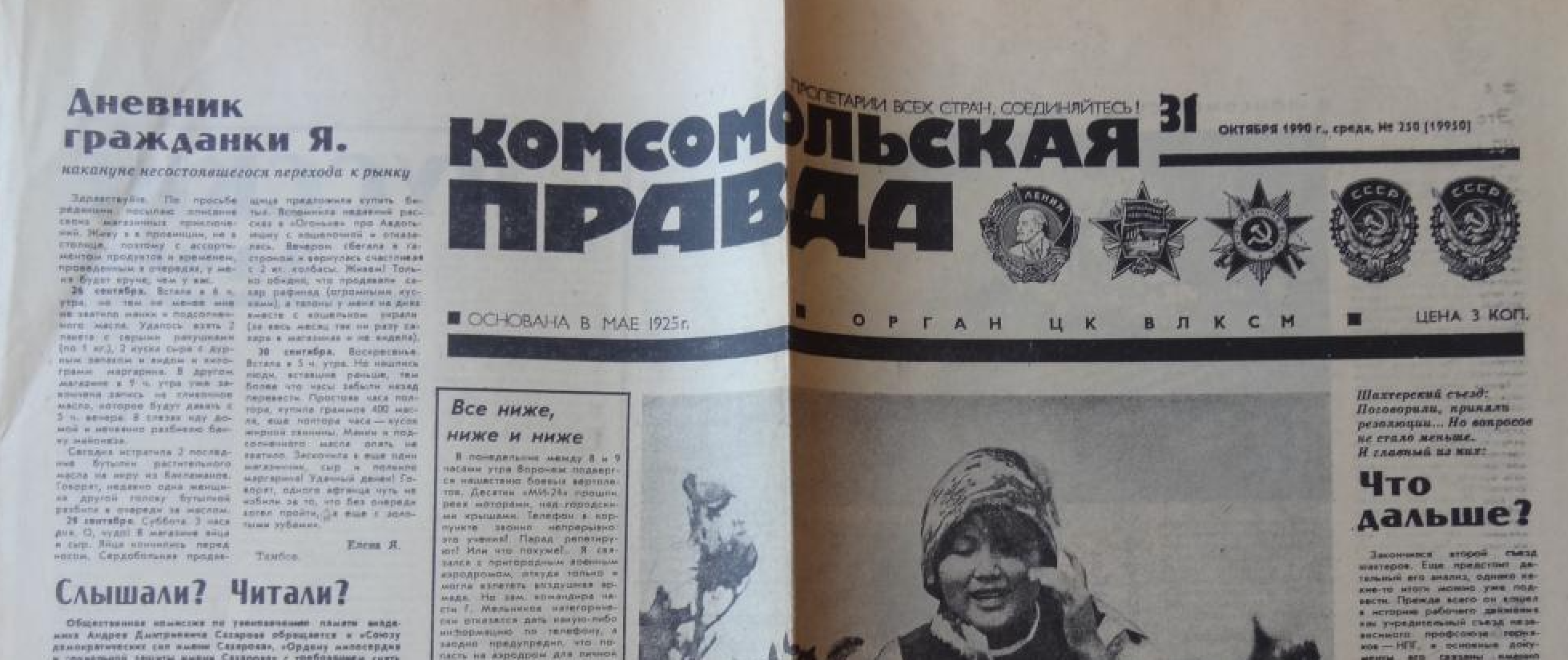Filed Under: Print > Journalism > Piskunov’s “Kitchen Diary” in “Komsomolskaya pravda”
Piskunov’s “Kitchen Diary” in “Komsomolskaya pravda”

From 4 through 31 October, S. Piskunov, a senior at Kiev Polytechnic Institute, documented shortages in his region by keeping a “kitchen diary.” Three days into his project, on 7 October, he noted that he traveled to the market to buy potatoes, since the store only sold potatoes “the size of walnuts” that “would fall out of your mesh bag on your way home.” At the market, the cost of potatoes varied from 70 to 90 kopecks per kilogram, depending on if you wanted to wait in line or not. If you bought them at 70 kopecks, there were 6 or 7 people in line. For 90 kopecks, there was no line. Piskunov’s diary responded to a call for “kitchen diaries” put out by the daily newspaper Komsomol’skaia pravda, where he sent his careful documentation in early November 1990.
On 29 September 1990, the front page of the newspaper had featured an editorial statement requesting that readers “keep diaries in the kitchen and send them to us.” While shortages had been a perennial feature of the Soviet command economy, 1990 marked a new juncture. By that year, shortages had again become a chronic problem, provoked in part by economic reforms issued under Gorbachev as part of a larger bid to transform the Soviet Union. By summer 1990, reformers including the General Secretary agreed that more radical measures were necessary. The government accepted the “Five Hundred Day Plan” devised by Stanislav Shatalin (1934-1997), an economic advisor to Gorbachev. As its name suggested, the Plan aimed to create the foundations of a market economy in roughly a year and a half, effectively ending the Soviet centralized economy.
The editors of Komsomol’skaia pravda encouraged readers to track shortages during the transition, describing kitchen diaries like Piskunov’s as the “thermometer under the armpit of reform.” Kitchen diaries like Piskunov’s were one practice that Soviet citizens used to negotiate shortages and navigate late Soviet economic reforms, the Five Hundred Day Plan in particular. This diary, and others like it, also highlight the role the Soviet press played in mediating the severe effects of economic transition on the broader Soviet population.
On 29 September 1990, the front page of the newspaper had featured an editorial statement requesting that readers “keep diaries in the kitchen and send them to us.” While shortages had been a perennial feature of the Soviet command economy, 1990 marked a new juncture. By that year, shortages had again become a chronic problem, provoked in part by economic reforms issued under Gorbachev as part of a larger bid to transform the Soviet Union. By summer 1990, reformers including the General Secretary agreed that more radical measures were necessary. The government accepted the “Five Hundred Day Plan” devised by Stanislav Shatalin (1934-1997), an economic advisor to Gorbachev. As its name suggested, the Plan aimed to create the foundations of a market economy in roughly a year and a half, effectively ending the Soviet centralized economy.
The editors of Komsomol’skaia pravda encouraged readers to track shortages during the transition, describing kitchen diaries like Piskunov’s as the “thermometer under the armpit of reform.” Kitchen diaries like Piskunov’s were one practice that Soviet citizens used to negotiate shortages and navigate late Soviet economic reforms, the Five Hundred Day Plan in particular. This diary, and others like it, also highlight the role the Soviet press played in mediating the severe effects of economic transition on the broader Soviet population.